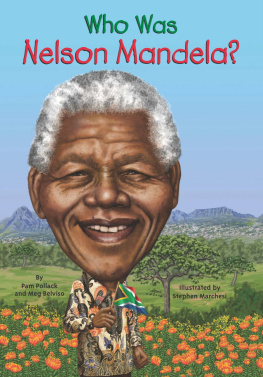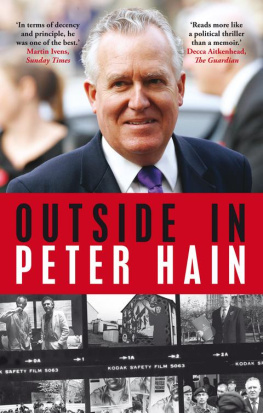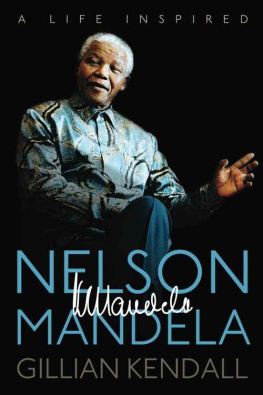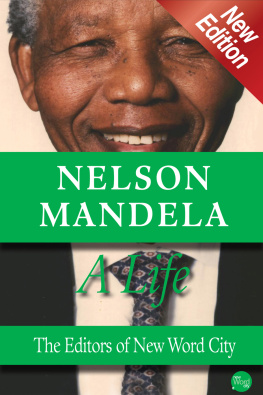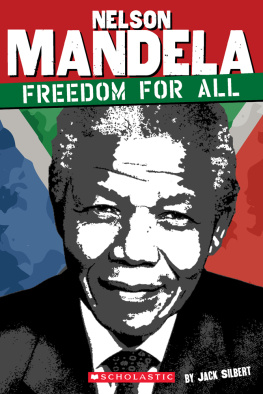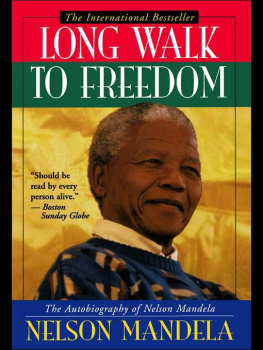Peter Hain - Mandela: His Essential Life
Here you can read online Peter Hain - Mandela: His Essential Life full text of the book (entire story) in english for free. Download pdf and epub, get meaning, cover and reviews about this ebook. year: 2020, publisher: Rowman & Littlefield International, genre: Politics. Description of the work, (preface) as well as reviews are available. Best literature library LitArk.com created for fans of good reading and offers a wide selection of genres:
Romance novel
Science fiction
Adventure
Detective
Science
History
Home and family
Prose
Art
Politics
Computer
Non-fiction
Religion
Business
Children
Humor
Choose a favorite category and find really read worthwhile books. Enjoy immersion in the world of imagination, feel the emotions of the characters or learn something new for yourself, make an fascinating discovery.

- Book:Mandela: His Essential Life
- Author:
- Publisher:Rowman & Littlefield International
- Genre:
- Year:2020
- Rating:3 / 5
- Favourites:Add to favourites
- Your mark:
- 60
- 1
- 2
- 3
- 4
- 5
Mandela: His Essential Life: summary, description and annotation
We offer to read an annotation, description, summary or preface (depends on what the author of the book "Mandela: His Essential Life" wrote himself). If you haven't found the necessary information about the book — write in the comments, we will try to find it.
Mandela: His Essential Life — read online for free the complete book (whole text) full work
Below is the text of the book, divided by pages. System saving the place of the last page read, allows you to conveniently read the book "Mandela: His Essential Life" online for free, without having to search again every time where you left off. Put a bookmark, and you can go to the page where you finished reading at any time.
Font size:
Interval:
Bookmark:
Peter Hain is well known for a lifetime of anti-apartheid campaigning. Born to anti-apartheid activists with links to Mandela going back to the 1950s, he grew up in South Africa where his parents were jailed, then banned and finally exiled to Britain by the regime. The effectiveness of Hains fervent campaigning in the 1970s made him a target of the regimes security services.
Subsequently a Labour MP and government minister, Peter Hain served in several prominent Cabinet positions including Secretary of State for Northern Ireland, Secretary of State for Work and Pensions, and Leader of the House of Commons. He is now a member of the House of Lords and Visiting Professor at Wits Business School, Johannesburg. A regular contributor to the daily nationals, he is also the author of twenty books including Dont Play with Apartheid, Mistaken Identity, A Putney Plot?, Back to the Future of Socialism and his memoir Outside In.
Benson, Mary. Nelson Mandela: The Man and the Movement. London: Penguin, 1994.
Carlin, John. Playing the Enemy. London: Grove Atlantic, 2008.
Hain, Peter. Sing the Beloved Country: The Struggle for the New South Africa. London: Pluto, 1996.
la Grange, Zelda. Good Morning, Mr. Mandela. London: Penguin, 2014.
Mandela, Nelson. Long Walk to Freedom. London: Little, Brown, 1994.
Mandela, Nelson, with Mandla Langa. Dare Not Linger: The Presidential Years. London: Macmillan, 2017.
Mandela, Winnie. Part of My Soul. Edited by Anne Benjamin and adapted by Mary Benson. London: Penguin, 1985.
Mandela: The Authorised Portrait. London: Bloomsbury, 2006.
Meredith, Martin. Nelson Mandela. London: Hamish Hamilton, 1997.
Reader, John. Africa: A Biography of the Continent. London: Penguin, 1998.
Sampson, Anthony. Mandela. London: HarperCollins, 1999.
Troup, Freda. South Africa: An Historical Introduction. London: Penguin, 1975.
B ut where did apartheid come from? How could a minority suppress the vast majority of South Africans simply because their skin color wasnt white? Mandelas people were and are the indigenous black people of the southern tip of Africa that came to be known as South Africa. It was their homeland. They farmed the countryside, they fished in the rivers and they moved their livestock over the mountains onto the plains and down through the valleys. The story of how that world was thrown upside down, how the people who used to be its masters became its slaves, goes back four centuries to when the first permanent white settlers from Europe, seeking a new life, landed at the Cape of Good Hope and found a land populated by Nelson Mandelas ancestors.
In 1652, the Dutch East India Company established the first settlement there, on the southwestern tip of Africa, to supply fresh food to the ships sailing to the Indies and back. Further bands of whites followed: Huguenot refugees from France in 1688 and later German immigrants. The Afrikaner people (who nearly three centuries later became the architects of apartheid) derived mainly from these three white ethnic groups.
In the Western Cape was the land of the indigenous nomadic herdsmen, the Khoikhoi (or Hottentots), which was progressively expropriated by the settlers. Eventually they, together with Malay slaves from the Dutch East Indies and the offspring of mixed-race marriages, became the Cape Coloured people (or Coloureds).
The other indigenous inhabitants, the San hunter-gatherers (Bushmen), were virtually eliminated by being hunted down and killed by whites. Additionally, from 1860 Indian indentured labor was imported by white entrepreneurs to work the sugarcane plantations in Natal, and they formed another significant racial group.
After Britain annexed the Cape in 1806, British settlement grew.
In 1820, some five thousand immigrants, including my mothers ancestors, were settled along the white side of the Fish River, about five hundred miles (800 km) east of the Cape, as a bulwark against the black chiefdoms (including Mandelas) that occupied most of the remaining area of the country.
By the 1830s, many Afrikaners (Boers) had become dissatisfied with British rule in the Cape. A major reason was the abolition of slavery, which for generations had provided the economic basis for Boer agriculture, together with the low compensation to slave owners paid by the British. So, in what became known as the Great Trek, they moved north-eastward into black territory, using the advantage conferred by their guns and horses to subdue any black chiefdoms that resisted them, and eventually established their own independent Boer states. Ultimately, almost the whole of the land of what is now known as South Africa had been expropriated and was under white dominance.
The home of the Zulu people, Natal, on the east coast and north of the lands inhabited by Mandelas Xhosa-speaking people, came under British rule in 1845, and most Boers living there then moved north into two Boer states: the Orange Free State in the middle and Transvaal to the north. Later, however, when the British attempted to interfere with the running of the two states, the First Boer War broke out. Britain was defeated and made peace in 1881.
Meanwhile, in 1871, diamonds had been discovered in the Cape near the border with the Orange Free State, and they attracted a large influx of workers including blacks. This was followed in 1886 by the discovery of vast gold reserves in the Transvaal. Huge numbers of black workers from the many traditional African communities, as well as white immigrants from Europe, were drawn into these two Boer republics.
So, by the beginning of the Second Boer War, in 1899, South Africa consisted of two British coloniesthe Cape and Natalplus the independent Boer (Afrikaner) republics of the Orange Free State and the Transvaal. This Second Boer War resulted from Britains wish to gain control of the northern gold mines (under the pretext of obtaining the vote for the foreigners who had flocked in to work them). It was a bloody conflict, finally ending with the defeat of the Boers in 1902; during it were established the first concentration camps. The British moved Boer families off the farms that provided bases for the marauding Boer guerrillas, crowding them into camps where sanitary conditions were primitive and disease was rife. Some twenty-six thousand Afrikaner women and children died, leaving an understandably deep scar on the Afrikaner psyche that still endures.
However, despite Britains victory, Afrikaner nationalism would not be extinguished. The treaty that ended the war led to negotiations and the eventual granting of South Africas independence in 1910. Under the Act of Union, political equality was given to all whites, but restrictions on the rights of blacks, Indians and Coloureds continued. So the conquest of the country ended with whites occupying 88 percent of the land they had chosen to farm and settle (and that just happened to contain all the countrys known natural resources). The main black chiefdoms, such as Nelson Mandelas Thembu (part of the Xhosa-speaking people), were shouldered aside into scattered and poor pockets of land away from the white areas and called native reserves.
The 1913 Natives Land Act, a cornerstone of South Africas racist legislation, prevented blacks from acquiring land in white areasall but 13 percent of the country. The act also enabled the eviction of surplus natives who had lived on white farms before their acquisition by the white owner. As a result, thousands of black families were driven off farms to wander homeless and starving. Blacks also lived in squalid townships called locations outside the urban areas. The main body of Indian people was in Natal, and most Coloureds were in the Western Cape; all of them lived in deprived conditions, albeit better than blacks.
Font size:
Interval:
Bookmark:
Similar books «Mandela: His Essential Life»
Look at similar books to Mandela: His Essential Life. We have selected literature similar in name and meaning in the hope of providing readers with more options to find new, interesting, not yet read works.
Discussion, reviews of the book Mandela: His Essential Life and just readers' own opinions. Leave your comments, write what you think about the work, its meaning or the main characters. Specify what exactly you liked and what you didn't like, and why you think so.

